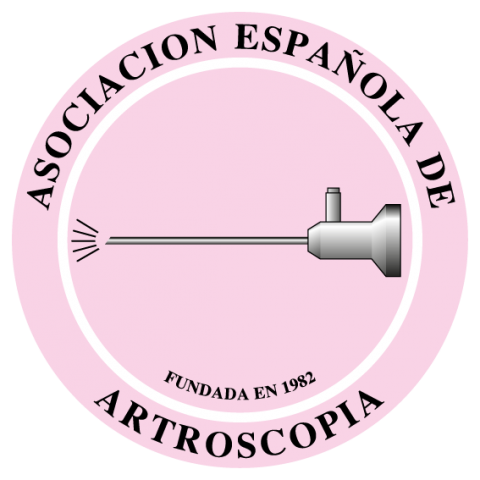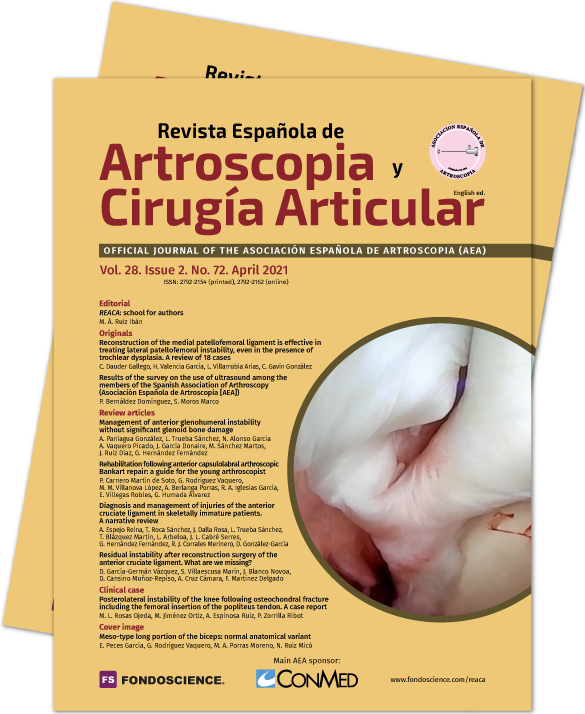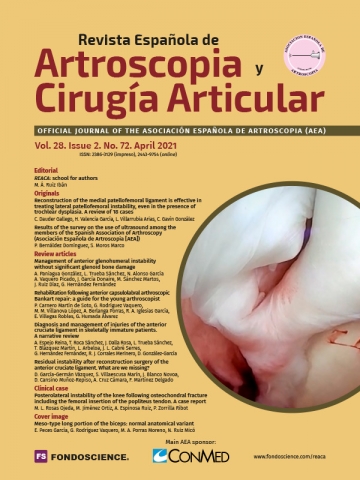In September 2020, Dr. Francesc Soler, the new Chairman of the Spanish Association of Arthroscopy (Asociación Española de Artroscopia [AEA]), called me to offer me the post of Editor of the Spanish Journal of Arthroscopy and Joint Surgery (Revista Española de Artroscopia y Cirugía Articular [REACA]). The post had been expertly held until then by Dr. Cuéllar, who played a key role in the journal not only during his period as Editor but also from its refoundation by Dr. Sánchez Alepuz in 2015. It was an offer which I was happy to accept, and I put myself to work on the project immediately. Taking charge of a journal that works perfectly and in the hope of improving upon it is a genuine challenge. The first step was to renew the editorial team: a group of young talents in arthroscopy and with broad experience in international publications (the physicians Jorge Díaz Heredia, Juan Erquicia, Carlo Gamba and Santos Moros) gladly joined the project. The next step was to define the strategic aims of the journal: increase its visibility, prepare it for possible indexing, and converting the journal into a space where young Spanish-speaking arthroscopists could send their first articles and learn the difficult art of transmitting scientific information with efficacy - essentially converting us into a school for authors.
The REACA, from its early times of the Notes in Arthroscopy (Cuadernos de Artroscopia), has always been the "reference journal" for Spanish arthroscopists. Thanks to dynamic papers written in Spanish by "our" authors, the readers were able to stay abreast of what was being done in the national reference centres and learn about the new advances proposed by our opinion leaders, with their innovating character and exceptional technical skills. However, the Internet, together with dedicated browsers such as PubMed, and the disappearance of the paper format as a means of scientific expression, have made it much more difficult for REACA to reach its readers. Monographic issues of course have represented an important step forward, and are a reference for many arthroscopists in training thanks to their quality, but the true impact of an article on original research published in the REACA has decreased at a time when almost all of our readers are able to understand written English and use online browsers as the main mechanism for accessing scientific information. It is therefore crucial to try to increase the visibility of the journal, and this requires its indexing in the commonly used browsers. I will not go into too much detail here on how this should be done, though I do wish to point out that since January 2021, the journal is fully translated into English, and the full-text articles are published in both Spanish and English. This has resulted in an important journal cost increment for the AEA - a cost which the Editorial Board has assumed, demonstrating its confidence in the new editorial project.
However, the key element of the new editorial orientation of the REACA is to convert the journal into a school for authors. The groups of specialists in arthroscopy in Spain that regularly publish studies in indexed international journals can be counted with the fingers of one hand. Nevertheless, there are many skilled and intelligent young arthroscopists with an interest in research that are starting their trajectory in quality investigations but have many difficulties transmitting their findings. Without the support of an already established group and with publishing experience, it is difficult to face the editorial process of the major journals and not become discouraged. From this point onwards, it is an explicit objective of the REACA to sponsor these professionals, helping them to advance as writers of scientific publications and train them as authors with a view to improving the quality of their original papers. We have all experienced the difficulties which aspiring authors face in publishing a text in a high-impact journal: strict standards referred to format and style, tedious submission processes, often pitiless Editors, severe and sometimes even offensive reviewers, etc. All these obstacles can be overcome, but training is needed, and in this aspect the REACA can be of help.
My message for those readers who feel identified with the above comment is: We are waiting for you. Have you discovered something new in your clinical practice or in your basic research? The editorial team of the REACA would be glad to help you to make it known to the scientific community. We don't intend to make it easy for you, because it is not easy, but the entire REACA team (Imaidea Interactiva, S.L., the reviewers, the Co-editors and myself as Editor) will be firm in pointing out the necessary improvements and will also show a friendly disposition to help you overcome the barriers to publication and learn how things must be done. So... stop reading and sit down and write! We are waiting for you.
Dr. Miguel Ángel Ruiz Ibán
Editor of REACA





